
The inspired writers of the Old Testament had a great perception of the majesty, the awful holiness of God. They knew that nothing defiled can stand before him. Yet we know from Paul (1 Cor. 13:12) that in heaven the soul has a vision of God, sees him face to face. That is metaphorical language (a soul has no eyes, God no face), yet it conveys awesome truth. It means the soul will know God directly.
How could that be? When we see someone on this earth, we take into our eyes and brain an image of him. That works well enough, for although any image is finite or limited, so is the person doing the imaging. But what image could make God known? None, of course. So the soul must know God without an image. This can be only if God directly joins himself to that soul, to do what an image would do in seeing others.
God will not join himself to anything defiled, yet that is precisely what Luther thought, what they think who claim infallible salvation. Luther claimed (in Epistle 501,written to Melanchthon), “Even if you sin greatly, believe more greatly.” The man may be (and really is) total corruption, according to Luther, but God does not mind that. The Holy Spirit could even dwell within total corruption, said Luther wrongly.
He thought justification was not a real cleansing—it was just that the merits of Christ, like a white cloak, would be thrown over the sins of the sinner. God would not look under the cloak, but the sinner would remain totally corrupt.
All this is impossible (nothing unclean shall enter heaven, says Revelation 20:27), so there must be some means of purgation after death, if the soul is not fully pure. There must be a purgatory.
Logically, if one follows out Luther’s fancy, a man who goes out and kills several others and then turns the gun on himself should go at once to be joined to the infinite purity of God! Luther wrote, “Be a sinner and sin boldly, but believe and rejoice in Christ even more boldly….No sin will separate us from the Lamb, even though we commit fornication and murder a thousand times a day.”
Judas Maccabeus was quite right in having sacrifices offered in the Temple for the souls of those fallen in battle who had sinned by wearing amulets (2 Mac. 12:42-46). But, our Protestant friends will object, that book is not in the Bible! To which we reply: A prominent Baptist professor, Gerald Burney Smith, in 1929 surveyed every means he could think of to determine which books are inspired and which are not. He found no possible way unless there would be a divinely-protected teaching authority to decide. Of course, he denied there was such an authority. He reported that Luther said that, if a book strongly preaches justification by faith, the book is inspired. But that cannot be true. Luther never proved that was the criterion, and, further, he could write such a book himself (and so could I), and it would not be inspired. Besides, many books of the Bible do not preach justification by faith at all, yet they are inspired.
Catholics have the sort of teaching authority Burney lacked. It is the Catholic Church, as we find from a study of apologetics. That teaching authority has determined that the Books of Maccabees are inspired. (Really, no Protestant should quote Scripture at all, for he has no means of determining which books are inspired—unless, of course, he accepts the authority of the Catholic Church!)


